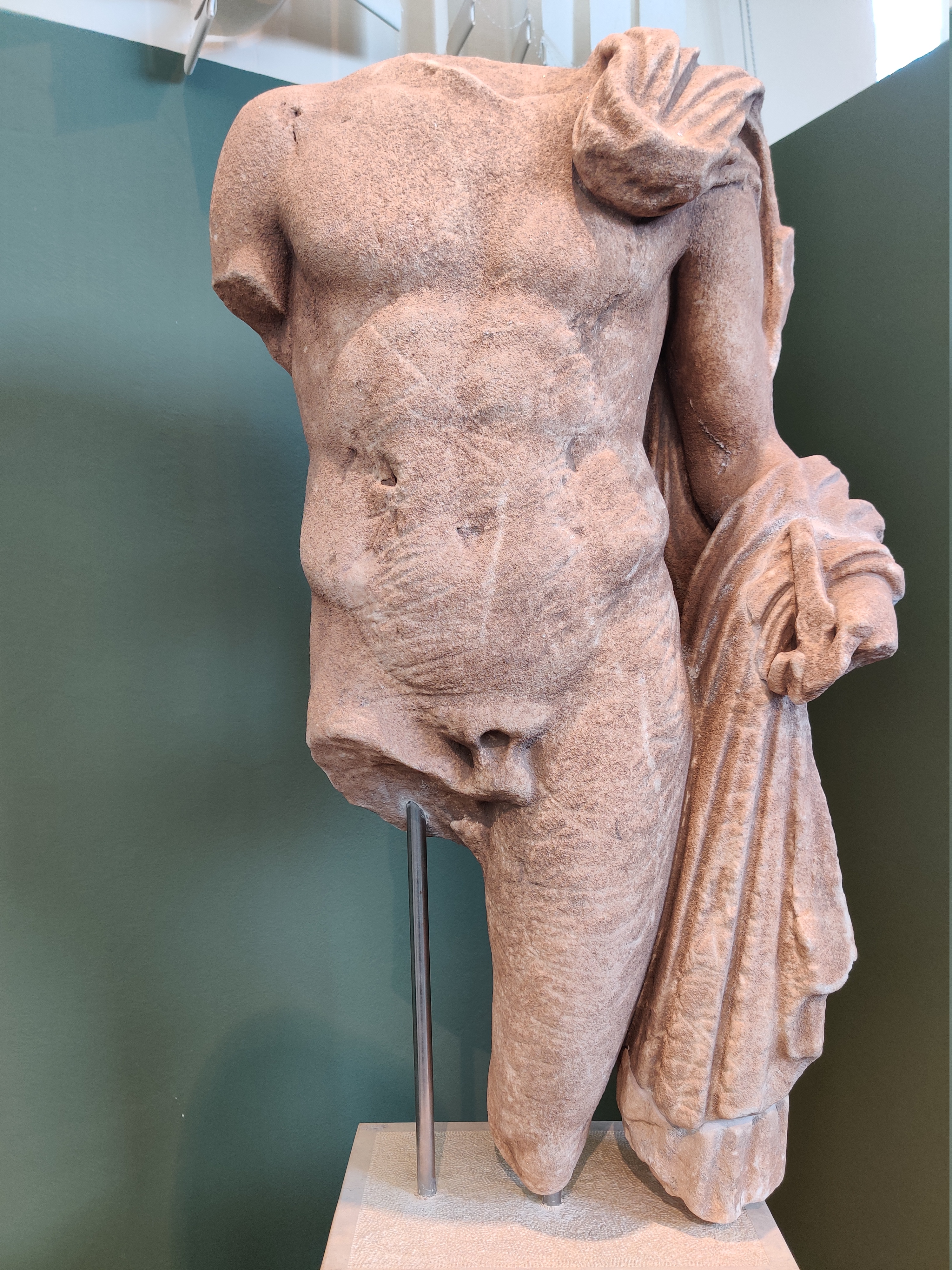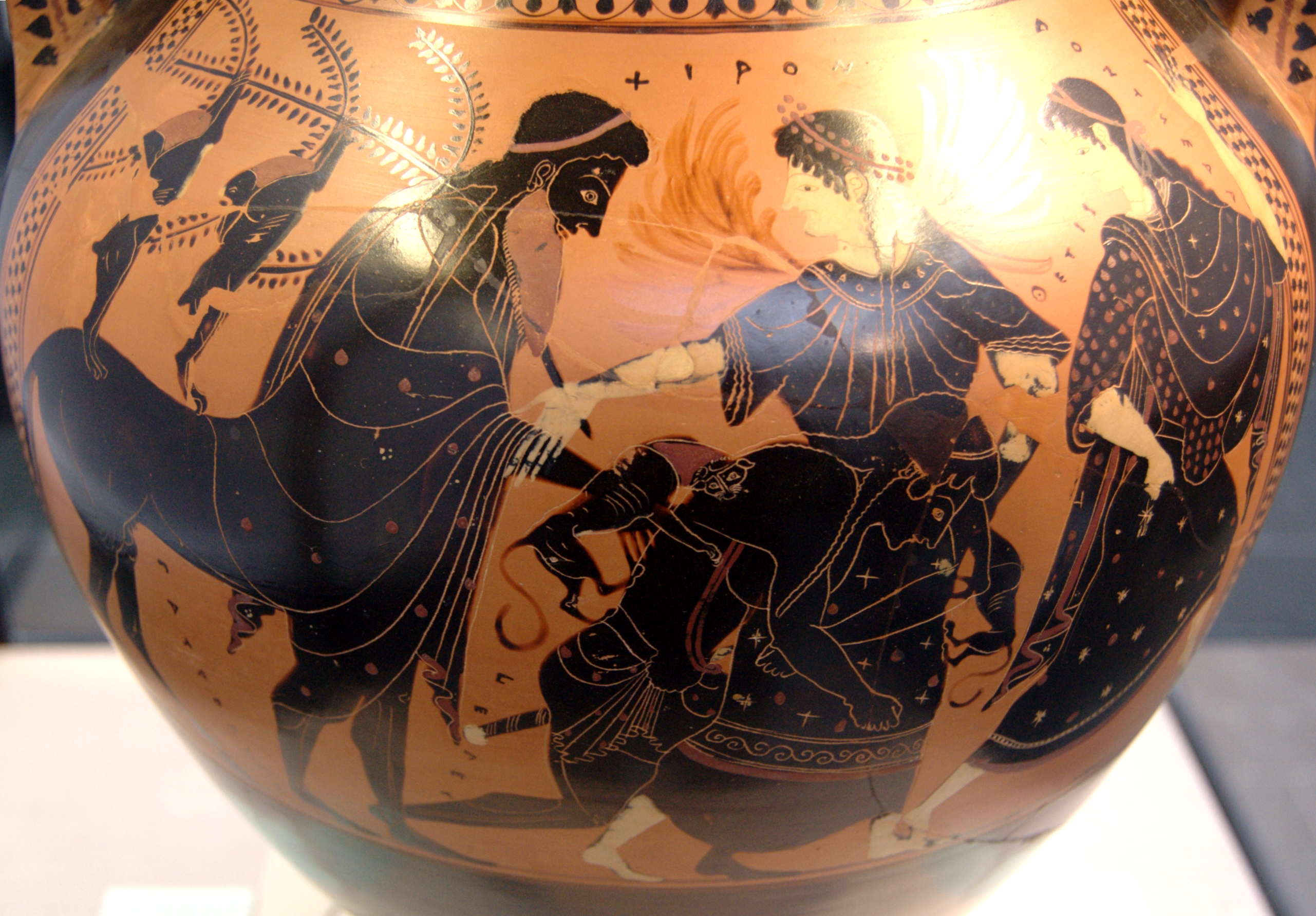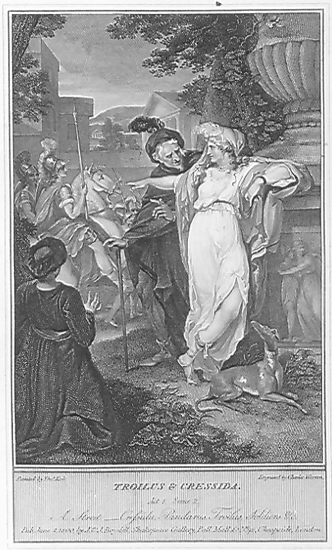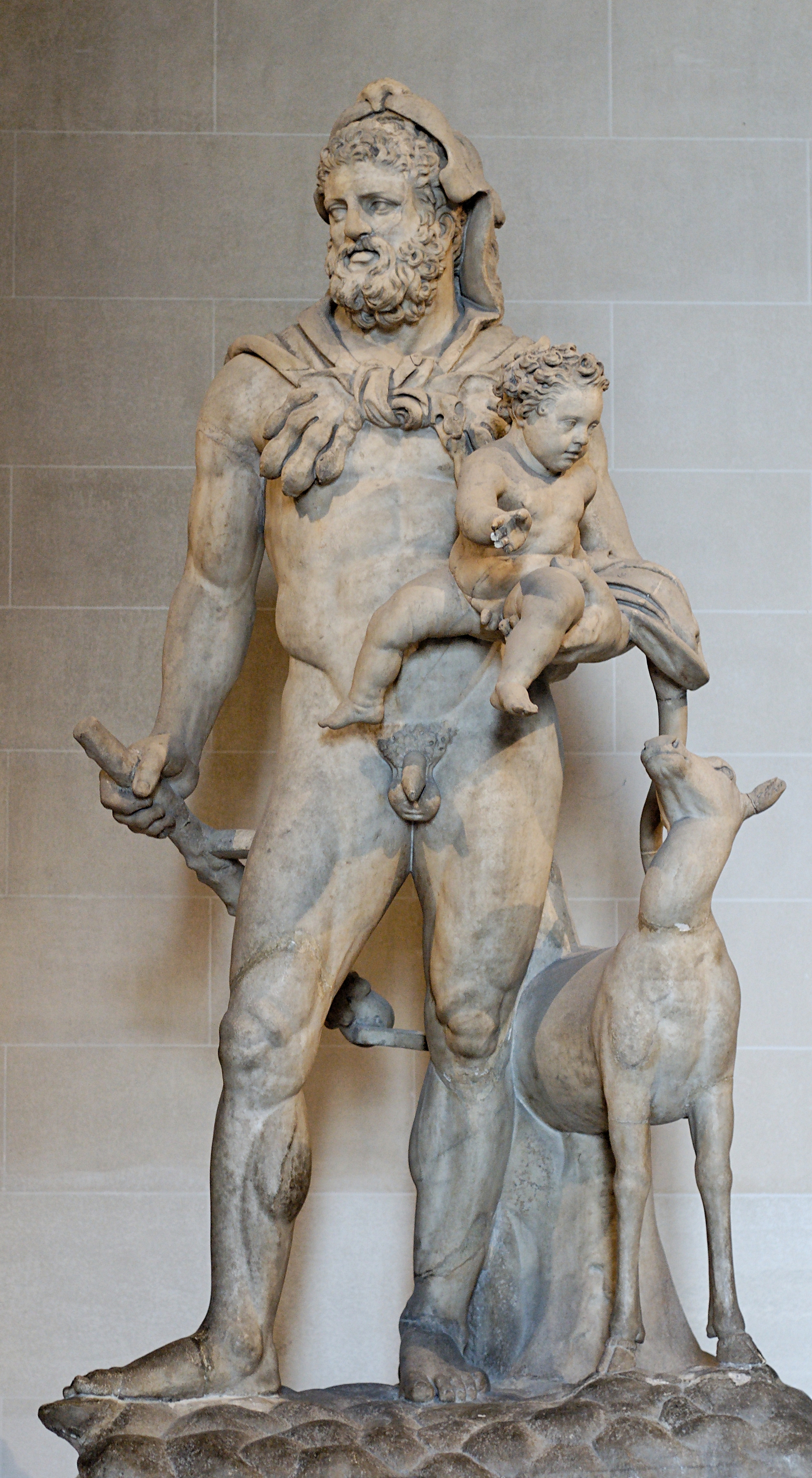|
Machaon (physician)
In Greek mythology, Machaon (; grc, Μαχάων, Macháōn) was a son of Asclepius; and the older brother of Podalirius. He and his brother led an army from Tricca in the Trojan War on the side of the Greeks. Description Meanwhile, in the account of Dares the Phrygian, Machaon was illustrated as ". . . large and brave, dependable, prudent, patient, and merciful." Family Machaon fathered Nicomachus and Gorgasus by Anticleia, daughter of Diocles of Pharae. His other sons were Alexanor, Sphyrus and Polemocrates. According to Diogenes Laertius's '' Lives and Opinions of Eminent Philosophers'', Hermippus, in his book ''On Aristotle,'' places Machaon as the son of Asclepius, father of Nicomachus, and ancestor of Aristotle. Mythology Both Machaon and Podalirius were highly valued surgeons and medics. In the ''Iliad'' he was wounded and put out of action by Paris. Machaon (or his brother) healed Philoctetes, Telephus and Menelaus, after he sustained an arrow at the hand ... [...More Info...] [...Related Items...] OR: [Wikipedia] [Google] [Baidu] |
Machaon Son Of Asclepius
Machaon may refer to: *Machaon (mythology), the son of Asclepius, a physician and warrior who fought for the Greeks in the Trojan War *''Papilio machaon ''Papilio machaon'', the Old World swallowtail, is a butterfly of the family Papilionidae. The butterfly is also known as the common yellow swallowtail or simply the swallowtail (a common name applied to all members of the family, but this speci ...'', or Old World swallowtail, a butterfly, also known as the common yellow swallowtail or simply the swallowtail See also *'' Machaonia'', a genus of flowering plants in the family Rubiaceae {{disambig ... [...More Info...] [...Related Items...] OR: [Wikipedia] [Google] [Baidu] |
Polemocrates (physician)
Polemocrates ( grc, Πολεμοκράτης), son of Machaon and grandson of Asclepius, was an ancient Greek physician. He had a sanctuary, at the village of Eua in Argolis and was honoured there as a god or hero of the healing art. References *Pausanias Pausanias ( el, Παυσανίας) may refer to: *Pausanias of Athens, lover of the poet Agathon and a character in Plato's ''Symposium'' *Pausanias the Regent, Spartan general and regent of the 5th century BC *Pausanias of Sicily, physician of th ... II 38. § 6. Ancient Greek physicians Ancient Argolis Asclepius {{AncientGreece-bio-stub ... [...More Info...] [...Related Items...] OR: [Wikipedia] [Google] [Baidu] |
Quintus Smyrnaeus
Quintus Smyrnaeus (also Quintus of Smyrna; el, Κόϊντος Σμυρναῖος, ''Kointos Smyrnaios'') was a Greek epic poet whose ''Posthomerica'', following "after Homer", continues the narration of the Trojan War. The dates of Quintus Smyrnaeus' life and poetry are disputed: by tradition, he is thought to have lived in the latter part of the 4th century AD, but early dates have also been proposed. His epic in fourteen books, known as the ''Posthomerica'', covers the period between the end of Homer's ''Iliad'' and the end of the Trojan War. Its primary importance is as the earliest surviving work to cover this period, the archaic works in the Epic Cycle, which he knew and drew upon, having been lost. His materials are borrowed from the cyclic poems from which Virgil (with whose works he was probably acquainted) also drew, in particular the '' Aethiopis'' (''Coming of Memnon'') and the ''Iliupersis'' (''Destruction of Troy'') of Arctinus of Miletus, the now-lost ''Heleneis' ... [...More Info...] [...Related Items...] OR: [Wikipedia] [Google] [Baidu] |
Eurypylus (son Of Telephus)
In Greek mythology, Eurypylus ("Broadgate") ( grc, Εὐρύπυλος ''Eurypylos'') was the son of Telephus, king of Mysia. He was a great warrior, who led a Mysian contingent that fought alongside the Trojans against the Greeks in the Trojan War. He killed Machaon, and was himself killed by Achilles' son Neoptolemus. Mythology Eurypylus' father was Telephus, who was the son of Heracles, and was the king of Mysia in Asia Minor. Telephus' mother was Auge, the daughter of Aleus, the king of Tegea, a city in Arcadia, in the Peloponnese of mainland Greece. Auge ended up at the court of the Mysian king Teuthras, as his wife, and Telephus became Teuthras' adopted son and succeeded Teuthras as king. According to one account, Telephus' wife was Laodice, the daughter of Priam, king of nearby Troy, while according to another, Telephus married Agriope a daughter of Teuthras. However, accounts that mention Eurypylus' mother, say that she was Astyoche, who was (usually) Priam's sister. ... [...More Info...] [...Related Items...] OR: [Wikipedia] [Google] [Baidu] |
Chiron
In Greek mythology, Chiron ( ; also Cheiron or Kheiron; ) was held to be the superlative centaur amongst his brethren since he was called the "wisest and justest of all the centaurs". Biography Chiron was notable throughout Greek mythology for his youth-nurturing nature. His personal skills tend to match those of his foster father Apollo, who taught the young centaur the art of medicine, herbs, music, archery, hunting, gymnastics and prophecy, and made him rise above his beastly nature. Chiron was known for his knowledge and skill with medicine, and thus was credited with the discovery of botany and pharmacy, the science of herbs and medicine.Pliny the Elder, ''Naturalis Historia'7.56.3/ref> Like satyrs, centaurs were notorious for being wild, lusty, overly indulgent drinkers and carousers, violent when intoxicated, and generally uncultured delinquents. Chiron, by contrast, was intelligent, civilized and kind, because he was not related directly to the other centaurs due to ... [...More Info...] [...Related Items...] OR: [Wikipedia] [Google] [Baidu] |
Pandarus
Pandarus or Pandar (Ancient Greek: Πάνδαρος ''Pándaros'') is a Trojan aristocrat who appears in stories about the Trojan War. In Homer's ''Iliad'' he is portrayed as an energetic and powerful warrior, but in medieval literature he becomes a witty and licentious figure who facilitates the affair between Troilus and Cressida. In Shakespeare's play ''Troilus and Cressida'', he is portrayed as an aged degenerate and coward who ends the play by telling the audience he will bequeath them his "diseases". Classical literature In Homer's ''Iliad'', Pandarus is a renowned archer and the son of Lycaon. Pandarus, who fought on the side of Troy in the Trojan War and led a contingent from Zeleia, first appeared in Book Two of the ''Iliad''. In Book Four, he is tricked by Athena, who wishes for the destruction of Troy and assumes the form of Laodocus, son of Antenor, to shoot and wound Menelaus with an arrow, sabotaging a truce that could potentially have led to the peaceful ret ... [...More Info...] [...Related Items...] OR: [Wikipedia] [Google] [Baidu] |
Menelaus
In Greek mythology, Menelaus (; grc-gre, Μενέλαος , 'wrath of the people', ) was a king of Mycenaean (pre- Dorian) Sparta. According to the ''Iliad'', Menelaus was a central figure in the Trojan War, leading the Spartan contingent of the Greek army, under his elder brother Agamemnon, king of Mycenae. Prominent in both the ''Iliad'' and ''Odyssey'', Menelaus was also popular in Greek vase painting and Greek tragedy, the latter more as a hero of the Trojan War than as a member of the doomed House of Atreus. Description In the account of Dares the Phrygian, Menelaus was described as ". . .of moderate stature, auburn-haired, and handsome. He had a pleasing personality." Family Menelaus was a descendant of Pelops son of Tantalus. He was the younger brother of Agamemnon, and the husband of Helen of Troy. According to the usual version of the story, followed by the ''Iliad'' and ''Odyssey'' of Homer, Agamemnon and Menelaus were the sons of Atreus, king of Mycenae and Ae ... [...More Info...] [...Related Items...] OR: [Wikipedia] [Google] [Baidu] |
Telephus
In Greek mythology, Telephus (; grc-gre, Τήλεφος, ''Tēlephos'', "far-shining") was the son of Heracles and Auge, who was the daughter of king Aleus of Tegea. He was adopted by Teuthras, the king of Mysia, in Asia Minor, whom he succeeded as king. Telephus was wounded by Achilles when the Achaeans came to his kingdom on their way to sack Troy and bring Helen back to Sparta, and later healed by Achilles. He was the father of Eurypylus, who fought alongside the Trojans against the Greeks in the Trojan War. Telephus' story was popular in ancient Greek and Roman iconography and tragedy. Telephus' name and mythology were possibly derived from the Hittite god Telepinu. Birth to adulthood Summary Telephus' mother was Auge, the daughter of Aleus, the king of Tegea, a city in Arcadia, in the Peloponnese of mainland Greece. His father was Heracles, who had seduced or raped Auge, a priestess of Athena. When Aleus found out, he tried to dispose of mother and child, but eventuall ... [...More Info...] [...Related Items...] OR: [Wikipedia] [Google] [Baidu] |
Philoctetes
Philoctetes ( grc, Φιλοκτήτης ''Philoktētēs''; English pronunciation: , stress (linguistics), stressed on the third syllable, ''-tet-''), or Philocthetes, according to Greek mythology, was the son of Poeas, king of Meliboea (Magnesia), Meliboea in Thessaly, and Demonassa or Methone (Greek myth), Methone. He was a Greek hero, famed as an archer, and a participant in the Trojan War. Philoctetes was the subject of four different plays of ancient Greece, each written by one of the three major Greek tragedians. Of the four plays, Sophocles' ''Philoctetes (Sophocles play), Philoctetes'' is the only one that has survived. Sophocles' ''Philoctetes at Troy'', Aeschylus' ''Philoctetes'' and Euripides' ''Philoctetes'' have all been lost, with the exception of some fragments. Philoctetes is also mentioned in Homer's ''Iliad'', Book 2, which describes his exile on the island of Lemnos, his being wounded by snake-bite, and his eventual recall by the Greeks. The recall of Philocte ... [...More Info...] [...Related Items...] OR: [Wikipedia] [Google] [Baidu] |
Paris (mythology)
Paris ( grc, Πάρις), also known as Alexander (, ''Aléxandros''), the son of King Priam and Queen Hecuba of Troy, is a mythological nobleman that appears in a number of Greek legends. Of these appearances, probably the best known was the elopement with Helen, queen of Sparta, this being one of the immediate causes of the Trojan War. Later in the war, he fatally wounds Achilles in the heel with an arrow as foretold by Achilles's mother, Thetis. The name ''Paris'' is probably of Luwian origin, and comparable to '' Pari-zitis'', attested as a Hittite scribe's name. The name Paris is etymologically unrelated to the name of the French city of Paris, which derives its name from a Gaulish tribe called the Parisii. Description Paris was described by the chronicler Malalas in his account of the ''Chronography'' as " well-grown, sturdy, white, good nose, good eyes, black pupils, black hair, incipient beard, long-faced, heavy eyebrows, big mouth, charming, eloquent, agile, ... [...More Info...] [...Related Items...] OR: [Wikipedia] [Google] [Baidu] |
Aristotle
Aristotle (; grc-gre, Ἀριστοτέλης ''Aristotélēs'', ; 384–322 BC) was a Greek philosopher and polymath during the Classical period in Ancient Greece. Taught by Plato, he was the founder of the Peripatetic school of philosophy within the Lyceum and the wider Aristotelian tradition. His writings cover many subjects including physics, biology, zoology, metaphysics, logic, ethics, aesthetics, poetry, theatre, music, rhetoric, psychology, linguistics, economics, politics, meteorology, geology, and government. Aristotle provided a complex synthesis of the various philosophies existing prior to him. It was above all from his teachings that the West inherited its intellectual lexicon, as well as problems and methods of inquiry. As a result, his philosophy has exerted a unique influence on almost every form of knowledge in the West and it continues to be a subject of contemporary philosophical discussion. Little is known about his life. Aristotle was born in th ... [...More Info...] [...Related Items...] OR: [Wikipedia] [Google] [Baidu] |
Nicomachus (father Of Aristotle)
Nicomachus ( grc, Νικόμαχος; fl. c. 375 BC) was the father of Aristotle. The ''Suda'' states that he was a doctor descended from Nicomachus, son of Machaon the son of Asclepius. Greenhill notes he had another son named Arimnestus, and a daughter named Arimneste, by his wife Phaestis, or Phaestias, who was descended from Asclepius as well. He was a native of Stageira, and the friend and physician of Amyntas III, king of Macedonia, 393–369 BC.William Alexander Greenhill, MD. "Nicomachus." ''Dictionary of Greek and Roman Biography and Mythology''. William Smith, editor. 1867. p. 1194. Aristotle's son was also called Nicomachus Nicomachus of Gerasa ( grc-gre, Νικόμαχος; c. 60 – c. 120 AD) was an important ancient mathematician and music theorist, best known for his works ''Introduction to Arithmetic'' and ''Manual of Harmonics'' in Greek. He was born in .... Notes 4th-century BC Greek physicians Ancient Stagirites Aristotle Old Macedonian kingdom< ... [...More Info...] [...Related Items...] OR: [Wikipedia] [Google] [Baidu] |




.jpg)


